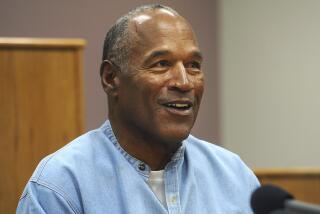George ‘Woody’ Clarke dies at 61; presented DNA data at Simpson trial
George “Woody” Clarke, who gained national prominence as the San Diego prosecutor asked by Los Angeles prosecutors to present the crucial but highly complex DNA evidence during the O.J. Simpson murder trial, has died. He was 61.
Clarke died Tuesday at Scripps Mercy Hospital in San Diego of complications from prostate cancer.
Clarke spent two decades as a deputy district attorney in San Diego before being named as a Superior Court judge in 2003. He had taken a leave as his health worsened but recently told friends that he expected to return soon to the bench; although in pain, he went to the office last Friday.
As a national television audience remained riveted to the Simpson trial with its issues of race, celebrity and domestic violence, Clarke, known for a patient, scholarly approach, guided the expert testimony about a complex set of numbers and scientific factors based on blood samples from the crime scene.
Clarke and other prosecutors believed the DNA proved that Simpson had killed his ex-wife Nicole and her friend Ronald Goldman outside her Brentwood home in June 1994.
In a trial centered on tragic events, Clarke was also at the center of one of the serio-comic moments.
Judge Lance Ito, exasperated at the lengthy objections posed by opposing attorneys, warned that the next lawyer to violate his dictum about brevity would be held in contempt. Moments later, when Clarke objected to a defense question, Ito held him in contempt and fined him $250.
Deputy Dist. Atty. Christopher Darden made a show of taking money out of his wallet and handing several bills to Clarke. (In San Diego, Clarke’s colleagues mockingly started a “Free Woody” fund.)
The jury’s acquittal of the former football great in October 1995 left Clarke and the other prosecutors stunned and wondering why the evidence he viewed as so compelling had been rejected by the jurors.
In 2008, Clarke compiled his career of courtroom experiences into a book, “Justice and Science: Trials and Triumphs of DNA Evidence.” Of the Simpson verdict, he wrote: “American culture seems to be obsessed with celebrity, and that obsession can skew the way reality is perceived.”
But he also wondered whether the prosecution had blundered by opting to present a detailed review of the DNA evidence rather than a quick summary.
Still, Clarke wrote semi-admiringly of defense attorney Johnnie L. Cochran Jr.’s flamboyant style and his assertion that the Los Angeles police crime lab was a “cesspool of contamination.” The assertion was scientifically weak but very effective as a trial tactic, Clarke wrote.
In San Diego, Clarke’s DNA presentations were key to winning convictions and death penalty verdicts in some of the region’s more high-profile murder cases, including that of serial killer David Allen Lucas, convicted of killing three people; and David Westerfield, convicted of killing a 7-year-old neighbor girl.
Clarke helped devise a DNA testing program for state prisoners convicted before genetic evidence became widely used in the early 1990s — a program meant to both solve crimes and possibly prove the innocence of wrongly convicted prisoners.
George Woodman Clarke was born in San Diego on May 10, 1951. His father, George Samuel Clarke, was a postmaster, and his mother, Evelyn, worked as a postal clerk. He grew up in the suburbs east of San Diego and graduated from Grossmont High School in La Mesa.
He received a bachelor’s degree from UC San Diego in 1973 and a law degree from the University of San Diego in 1977. After working as a legal researcher, he considered going into criminal defense work but decided in 1982 to join the district attorney’s staff for a few years to gain legal experience.
He stayed 22 years and stood out with his low-key, genial personality.
“He was not one of these in-your-face prosecutors,” said Superior Court Judge Peter Deddeh, who worked with Clarke when both were deputy district attorneys. “He was a very good match with the more hard-charging, aggressive trial attorneys.”
In the mid-1980s, Clarke became one of the first prosecutors to begin exploring the use of DNA evidence in trials. Soon he became known in the legal profession as an expert in presenting complex, numbers-heavy genetic evidence to juries.
“He was a calm, rational voice for the scientific validity of DNA, a true pioneer,” said Greg Thompson, former assistant district attorney, now a senior policy advisor for the Sheriff’s Department.
Even when the media buzz of the Simpson trial cooled, Clarke’s status as a DNA expert grew: He was appointed in 1998 to the U.S. Department of Justice Commission on the Future of DNA Evidence, and in 2002 to the U.S. Attorney General Initiative on DNA Laboratory Backlogs. In 2003, he was named Outstanding Prosecutor of the Year by the California District Attorneys Assn.
Clarke is survived by his wife, Michele; their daughter, Samantha; and his brothers Peter and William.
More to Read
Start your day right
Sign up for Essential California for the L.A. Times biggest news, features and recommendations in your inbox six days a week.
You may occasionally receive promotional content from the Los Angeles Times.



















































